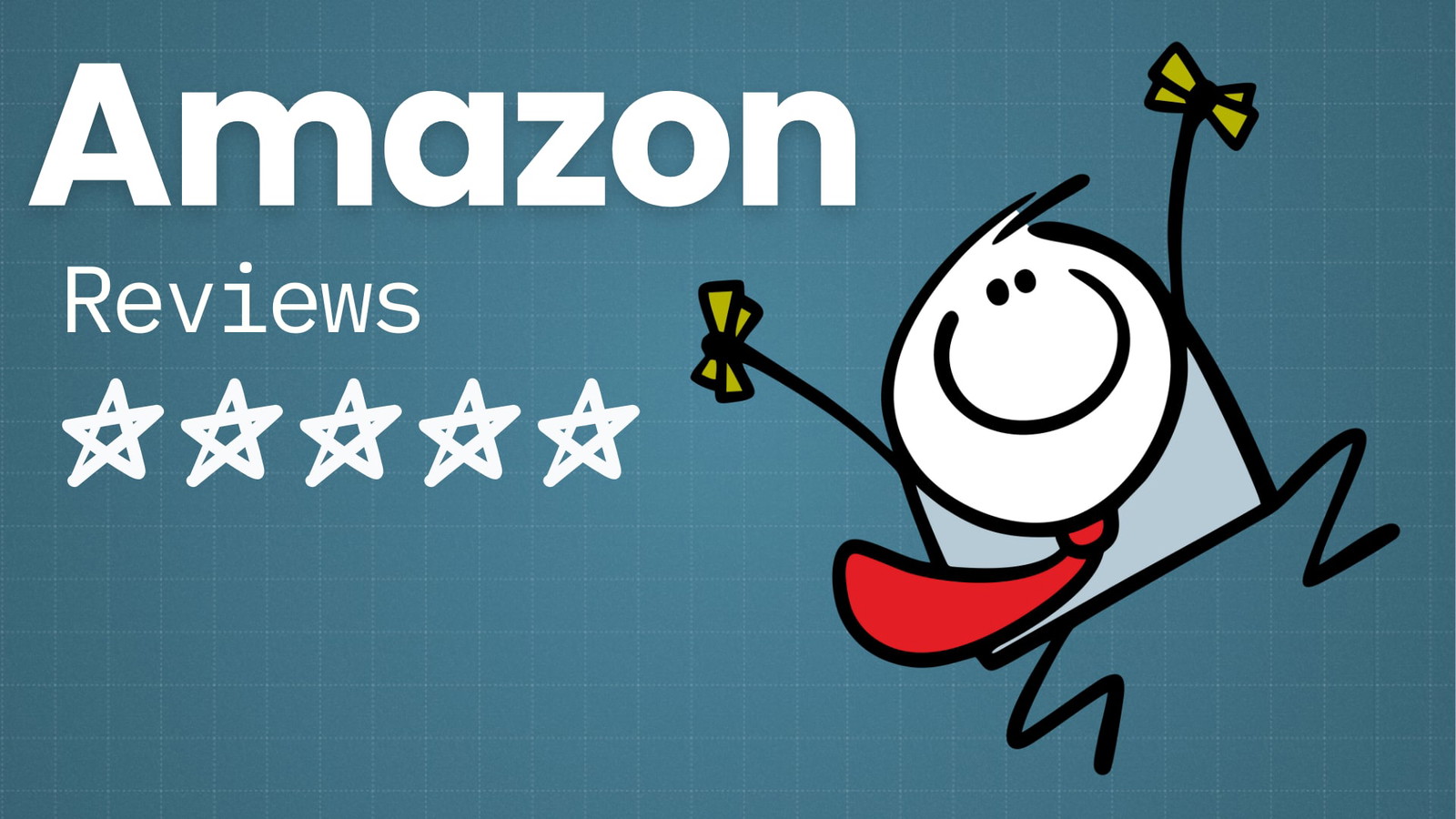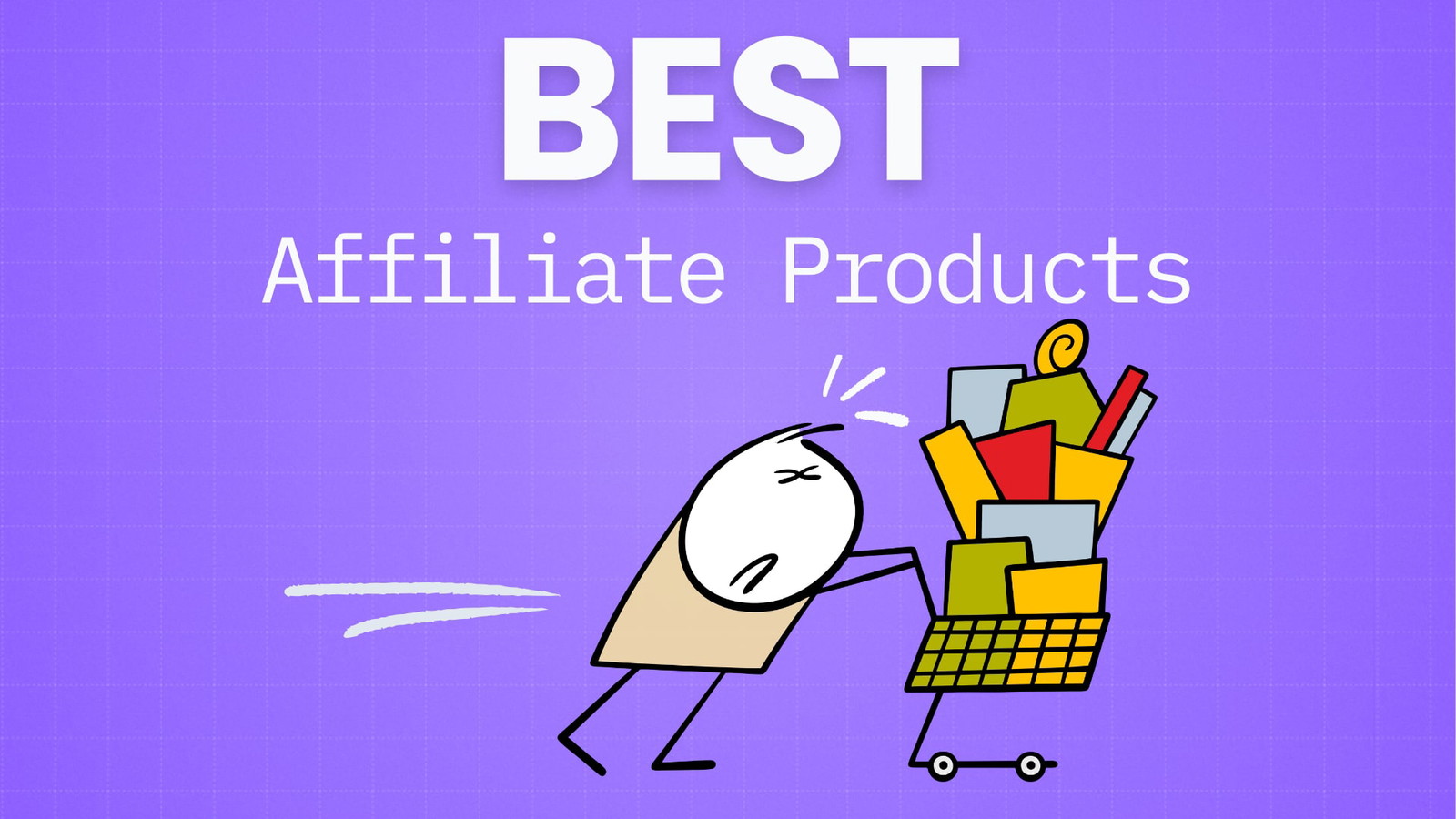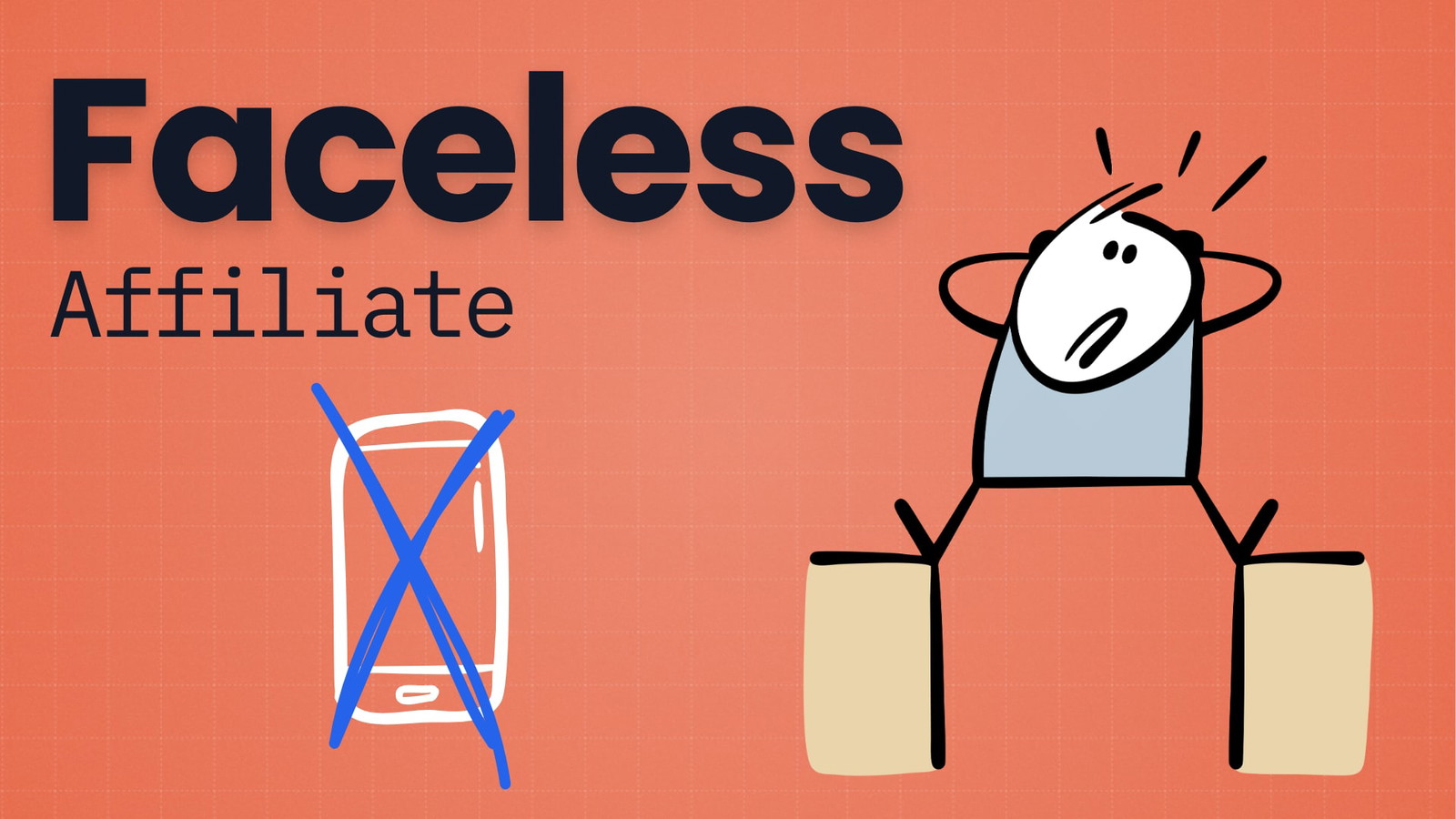We live in an entrepreneurial age.
Two in five Americans plan to start their own business in 2022, according to research from Digital.com, while a survey from Junior Achievement USA found that 60% of teens would rather start their own business than have a traditional job.
And, with the ever-growing popularity of ecommerce, it’s a fair bet a lot of those would-be entrepreneurs are planning to start their own online store.
Which brings us nicely to our Shopify affiliate program review. As one of the world’s biggest ecommerce platforms, it’s the number one port of call for many ecommerce first-timers, making it an affiliate program with tons of earning potential.
(Which explains why we included it in our roundup of 29 high-paying affiliate programs for 2024.)
In our Shopify affiliate review, we’ll explain:
- What Shopify does
- Why affiliate marketers should be interested in promoting Shopify
- How the Shopify affiliate program works
- What we love about the affiliate program (and what’s not so great)
About Shopify
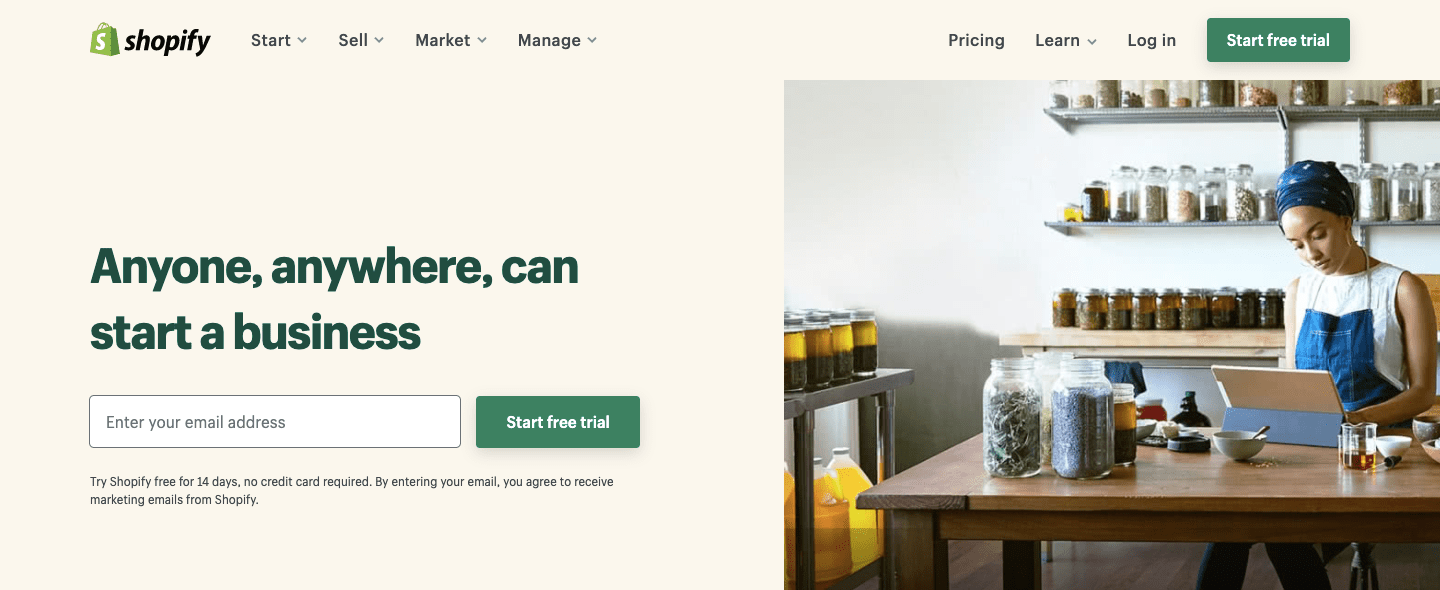
Shopify sells ecommerce software that gives individuals, small businesses, and massive companies the tools they need to sell things online.
Launched back in 2006, it’s been used by retailers in 175 countries to generate almost $500 billion in sales.
And because Shopify charges users a subscription to use its services, it’s made plenty of cash itself along the way ($4.8 billion in the most recent financial year, to be precise).
According to BuiltWith, there are 3.9 million currently live websites using Shopify, of which about 2% are in the top million sites by traffic volume on the whole internet.
In terms of e commerce market share, Shopify is the world’s second-largest ecommerce technology platform among the top one million traffic-generating sites.
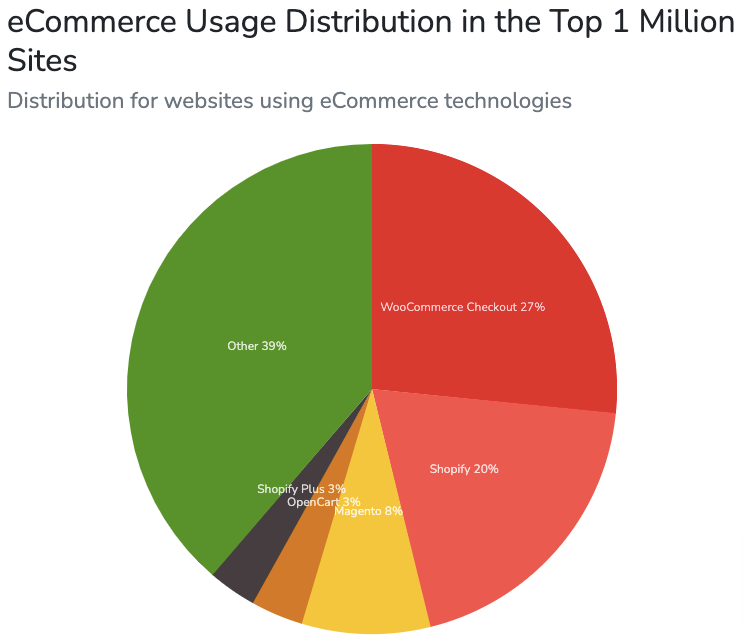
In short, if you’ve got an entrepreneurially-minded audience that’s interested in making money online, you could do a lot worse than promote Shopify.
Now, let’s look at how to make it happen.
How Does the Shopify Affiliate Program Work?
How to Register for Shopify’s Affiliate Program
Before we dive into the specifics of how to sign up, bear in mind that Shopify has specific requirements about who can apply. To be accepted for its affiliate program, you must:
- Run your own active affiliate blog or website
- Have an established (and relevant) audience
- Published content related to Shopify’s services, such as blogs, videos, or online courses
- Have some experience using Shopify or a different ecommerce solution
- Have read and agreed to the Shopify Partner Program Agreement (you can find it here)
Provided you satisfy all of the above, you can get on with applying.
Shopify used to run its own affiliate program, but since June 2022, it’s been powered by the Impact affiliate network.
Hit the Apply Now button on Shopify’s affiliate landing page…
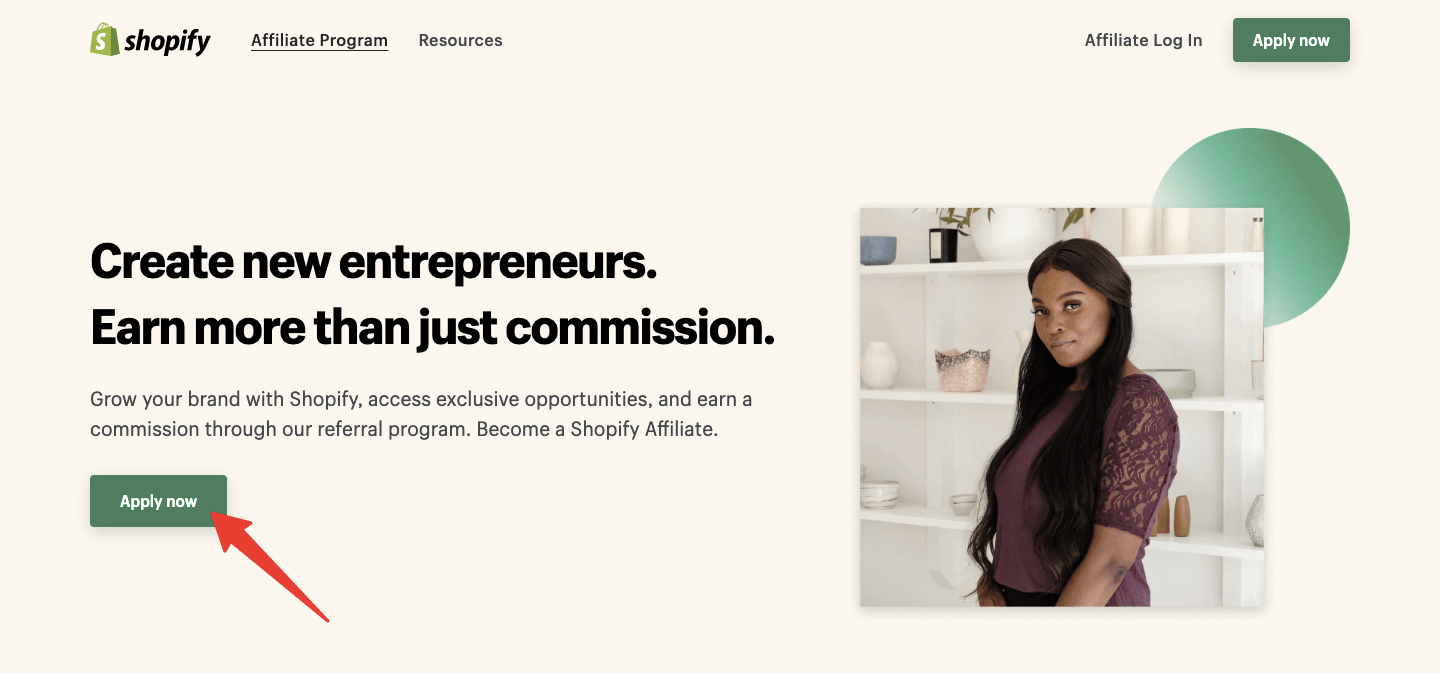
…and you’ll be transported to the Impact site.
If you’re not already an affiliate marketer on Impact, you’ll need to sign up. That means providing a bunch of information about you and your website, such as the primary means by which you generate website traffic.
Impact reviews all applications manually, which can take up to two business days.
Next, you’ll need to apply for the Shopify affiliate program too. This doesn’t require you to answer any more questions, but Shopify will take a look at your credentials and decide whether or not you’re a good fit.
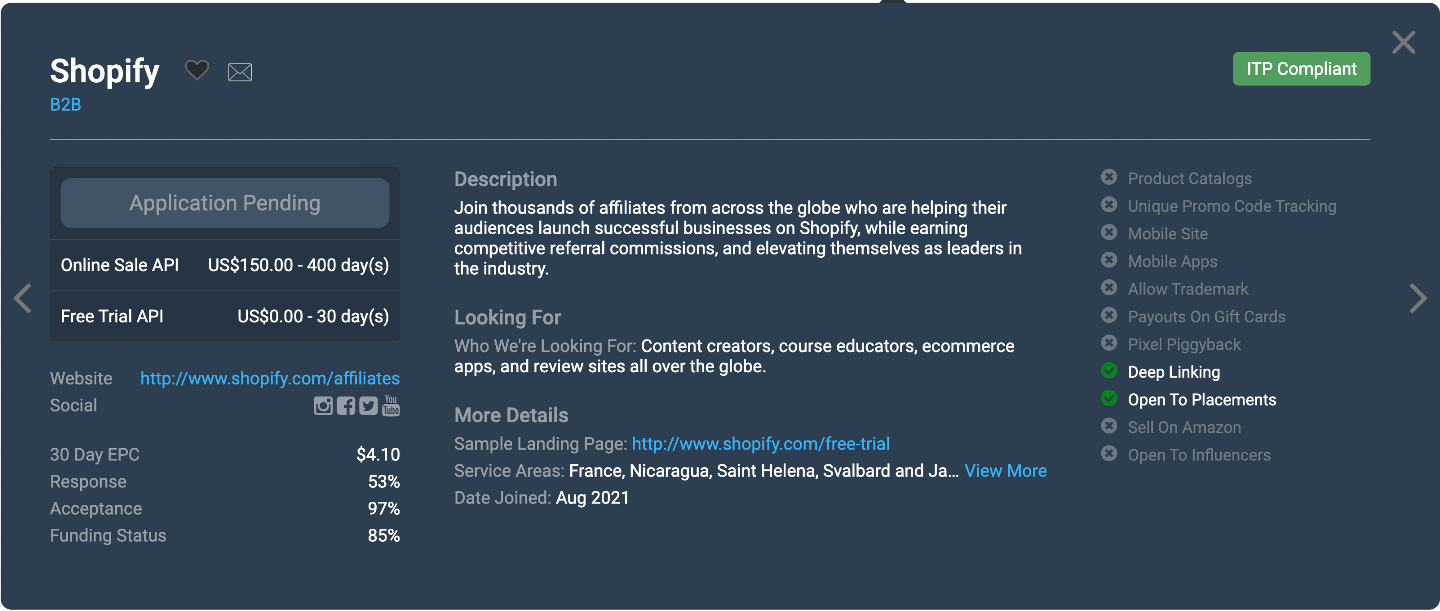
In most cases, your application will be processed within five business days. Hopefully, you’ll be accepted — but if not, be aware that as a rule, Shopify doesn’t provide feedback on unsuccessful applications.
What Are the Shopify Affiliate Program Commission Rates
If you read the FAQs on the Shopify affiliate program landing page, you’ll find the following information about commission rates:

Not very helpful.
Fortunately, we’ve done the hard work for you and found a more specific answer: Shopify pays affiliates a fixed bounty of $150 for each qualified referral.
In other words, when a potential Shopify merchant clicks an affiliate link on your website, lands on Shopify’s website, and signs up for a subscription, you get $150. That’s the case whether they choose a $29/month Basic Shopify plan or an Advanced package, priced at $299 per month.
There’s also the Shopify Partner program, which is open to designers, developers, marketers, and affiliates who use the Shopify platform to create ecommerce websites, themes, and Shopify apps.
The partner program offers three additional ways to make money:
- Referring clients to Shopify
- Creating ecommerce themes and publishing them in the Shopify Theme Store
- Developing Shopify apps and publishing them in the Shopify App Store
So while you’ll need a certain amount of technical skills to join the partner program, the earnings can be a whole lot higher.
For instance, Shopify currently pays a commission of $500 – $3,000 for every new Point of Sale Pro Merchant referred by a Partner, while sales of Shopify Starter, Shopify Basic, Shopify, and Advanced Shopify plans offer a recurring commission equal to 20% of the visitor’s monthly subscription fee.
You can find an up-to-date list of Shopify Partner commission rates here.
What Cookie Duration Does Shopify Offer
Shopify offers a standard 30-day cookie duration.
That means once someone clicks your referral link, you’ll earn your $150 commission provided they sign up for a 14-day Shopify free trial within those 30 days.
Which Payment Methods Can Shopify Affiliates Choose
While Impact allows a range of payment methods, Shopify itself only allows payouts to your PayPal account.
That’s right: no bank transfer, no debit or credit card, no crypto or gift cards. If you don’t have a PayPal account, or simply don’t want to use the platform, the Shopify affiliate program isn’t for you.
Provided you’re cool with the whole PayPal thing, Shopify offers the following payment terms:
- Credits created between the 1st – 15th of the month will be paid five business days after the 15th.
- Credits created from the 16th to the final day of the month will be paid five business days after the last day of the month.
Shopify also says it’ll withhold commission payments of less than $25 until the following payment period. But given it only offers one bounty rate of $150 per sale, this doesn’t seem relevant.
In case you encounter any problems or have questions about its payment methods, you can reach out to your dedicated affiliate manager, who’ll do their best to resolve the issue.
Pros & Cons of the Shopify Affiliate Program
Pros
Shopify is one of the biggest names in ecommerce software, which makes it a comparatively easy sell.
It offers plans for merchants of all sizes, from one-person startups to huge enterprises.
The cookie window is ok, giving you full value from the customers you refer.
Impact offers excellent, user-friendly affiliate marketing software, so it’s easy to track your sales, create links, and find marketing insights.
Prospective merchants can sign up for a 14-day Shopify free trial, which can help affiliate marketers to close the deal.
Cons
The $150 commission rate isn’t especially generous, especially if you’re selling a $299/month Shopify Advanced plan.
A bounty commission isn’t as attractive as a recurring commission based on the visitor’s monthly subscription fee.
The lack of choice around payment methods isn’t great if you don’t like, or can’t use, PayPal.
Ultimately, it’s all about your audience.
If you’re reaching the types of people who’d be interested in Shopify’s e commerce software — prospective entrepreneurs, ecommerce startups, existing online stores — there’s definitely good money to be made here.
But if you compare Shopify to Woocommerce (or some of the other ecommerce solutions out there), you’ll see it’s not particularly cheap. So if you’re going to close the deal, you’ll need a professional-looking site and high-quality, authoritative educational content.
That takes time — but we can help. Just sign up for our free training and we’ll reveal seven secrets that make new sites 83% more successful.



